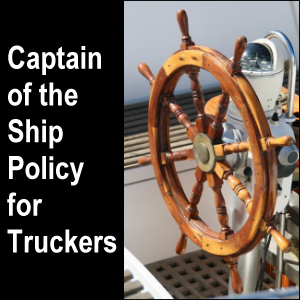Many trucking companies talk a good line. But if there is a written “Captain of the Ship” policy regarding unsafe working conditions or situations — especially when there are equipment problems — then truckers are empowered to correct those problems.
Personal Application
 A professional truck driver we know had been working for a trucking company for a number of years.
A professional truck driver we know had been working for a trucking company for a number of years.
From the day he was hired as a company driver and found out what the state of the company’s equipment was — especially the rig that he was going to be driving — he knew that he was going to have to force the company to spend money to bring the equipment into compliance.
Almost 3 years had passed when the company underwent a change and the trucking “arm” was subcontracted out to another company.
It just so happened that the subcontracted company was taking over all of the equipment — complete with its history of neglect and abuse.
What the Policy Includes
The subcontracted company had a so-called “Captain of the Ship” policy containing the following attributes:
- It applies to all employees and operations.
- It empowers every employee to act as “captain of the ship” when immediate action is required to correct potentially unsafe conditions or situations.
- It expects employees to take whatever actions are required to correct potentially unsafe conditions or situations.
- It means that drivers have the right and responsibility to stop driving when they feel that they cannot proceed safely.
- In defining the “right to stop driving,” the policy says that drivers have the freedom to make this decision without fear of retribution and that company management will support drivers’ decisions and not pressure them to take risks when they feel that they cannot proceed safely.
- It also holds drivers accountable for both notifying managers of poor or unsafe driving conditions as well as collisions that occur during poor weather or other unsafe driving conditions.
Will the Captain of the Ship Policy Work?
Then came the day when the trucker took his rig into a terminal for fuel and an inspection.
The brakes on the rear axle needed to be replaced.
The mechanic on duty said that they would last only about another two weeks. (Obviously, when a trailer’s brake shoes get down so low, hauling it becomes an unsafe work condition.)
The subcontracted company stated that they didn’t want to put any more money into the old equipment and that a new trailer was coming.
“When?” the trucker asked. The only answer that came was that they didn’t know.
So to prevent unsafe working conditions for himself, the trucker said that one of three things was going to happen by the end of the second week:
- The company was going to replace the whole trailer;
- The company was going to replace the designated brake shoes; or
- The trucker was going to put the trailer out of service himself.
In fact, the trucker went so far as to state that if he had to put the trailer out of service, he might just put his own king pin lock on the trailer to prevent the subcontracted company from trying to slip it back into service in sub-par condition.
He also planned to notify his supervisor and his other co-workers about the trailer’s problem so that none of them would be forced into taking that trailer on the road before it was fixed or replaced.
Perhaps the trucker will share with us the outcome of this Captain of the Ship “showdown” after the two weeks is over.
In the meantime, we commend him for standing his ground regarding not being pressured or bullied into using unsafe equipment.
Update: The trucker was forced to put the rig out of service.
![]() Money saving tip: Regardless of whether or not your trucking company has a “Captain of the Ship” policy, familiarize yourself with the federal regulations regarding your equipment and how to operate it safely.
Money saving tip: Regardless of whether or not your trucking company has a “Captain of the Ship” policy, familiarize yourself with the federal regulations regarding your equipment and how to operate it safely.
Even though the CSA “ranks” certain things as having more points than others, you don’t want any points to be assessed against you as a trucker for equipment that you know isn’t safe.(1)
Regarding truck brakes, one writer points out, “The points are the last thing I’d worry about … In a pinch, brake performance can be the difference between life and death. That’s a lesson some learn only the hard way.”
Remember what § 392.7 says (emphasis added): “(a) No commercial motor vehicle shall be driven unless the driver is satisfied that the following parts and accessories are in good working order, nor shall any driver fail to use or make use of such parts and accessories when and as needed….”
Even if it is a condition of employment to take a load when your company tells you to, there are overriding principles of safety regarding your equipment.
Finally, if it comes down to this, the Surface Transportation Assistance Act (STAA) is on your side if you are fired for blowing the whistle on unsafe working conditions or situations.
Return from Captain of the Ship Policy and Unsafe Working Conditions to our Truck Operations page or our Truck Drivers Money Saving Tips home page.
Reference
1. www.csa2010.com/articles/CSA_2010_Vehicle_Maintenance_Violation_Severity_Chart.htm (no longer online)







